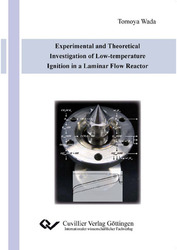| Areas | |
|---|---|
| Serie de libros (97) |
1382
|
| Nachhaltigkeit |
3
|
| Gesundheitswesen |
1
|
| Letra |
2372
|
| Ciencias Naturales |
5408
|
| Matemática | 228 |
| Informática | 320 |
| Física | 980 |
| Química | 1364 |
| Geociencias | 131 |
| Medicina humana | 243 |
| Estomatología | 10 |
| Veterinaria | 108 |
| Farmacia | 147 |
| Biología | 835 |
| Bioquímica, biología molecular, tecnología genética | 121 |
| Biofísica | 25 |
| Nutrición | 45 |
| Agricultura | 1005 |
| Silvicultura | 201 |
| Horticultura | 20 |
| Ecología y conservación de la tierra | 148 |
| Ciencias Ingeniería |
1798
|
| General |
98
|
|
Leitlinien Unfallchirurgie
5. Auflage bestellen |
|
Erweiterte Suche
Experimental and Theoretical Investigation of Low-Temperature Ignition in a Laminar Flow Reactor (Tienda española)
Tomoya Wada (Autor)Previo
Indice, Datei (55 KB)
Lectura de prueba, Datei (77 KB)
The main purpose of this dissertation is to investigate low-temperature ignition in detail. In the previous findings with conventional fuels such as diesel, gasoline, or jet fuels, first- and second-stage ignitions are observed in the negative temperature coefficient regime due to high- and low-temperature chemistry (LTC and HTC). As results from these investigations have shown, it is well-known that this temperature regime has high potential to reduce emission in applications. In general, these ignitions are observed sequentially (i.e., two ignition processes are observed as the overall-ignition). On the other hand, the importance of first-stage ignition due to low-temperature chemistry has been noted as one of the dominant phenomena in the overall-ignition process. In order to observe the ignition at low temperatures, a laminar flow reactor (LFR) has been developed. This LFR allows the experimental observations of only low-temperature ignition (i.e., first-stage ignition (FSI)). In other words, LFR extracts only FSI from the overall-ignition process. N-heptane, dimethyl ether and their mixtures are chosen as fuels. The entire LFR remains at isothermal conditions. Temperature increase due to the FSI in LFR and the products from FSI are experimentally measured. Numerical calculations are conducted to simulate the experiments. Based on the experimentally and numerically determined results theoretical models are established.
Combustion and flame
http://www.journals.elsevier.com/combustion-and-flame/
Combustion Science and Technology
http://www.tandf.co.uk/journals/titles/00102202.html
Combustion Theory and Modeling
http://www.tandf.co.uk/journals/titles/13647830.asp
Journal of combustion
http://www.hindawi.com/journals/jc/
International Journal of Chemical Kinetics
http://onlinelibrary.wiley.com/journal/10.1002/(ISSN)1097-4601
Proceedings of Combustion Institute
http://www.journals.elsevier.com/proceedings-of-the-combustion-institute/
| ISBN-10 (Impresion) | 3869559306 |
| ISBN-13 (Impresion) | 9783869559308 |
| ISBN-13 (E-Book) | 9783736939301 |
| Formato | A5 |
| Idioma | Inglés |
| Numero de paginas | 224 |
| Laminacion de la cubierta | mate |
| Edicion | 1 Aufl. |
| Volumen | 0 |
| Lugar de publicacion | Göttingen |
| Lugar de la disertacion | Aachen |
| Fecha de publicacion | 29.11.2011 |
| Clasificacion simple | Tesis doctoral |
| Area |
Química
Ingeniería Ingeniería mecánica y de proceso |








